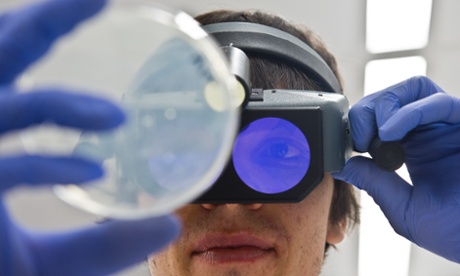Up to eight researchers at Australian Animal Health Laboratory in Geelong may lose their jobs, CSIRO staff association says

CSIRO researchers working on the Ebola virus could be the latest victims of budget cuts, the union has claimed, as Australia’s chief scientist said it was a myth that the country punched above its weight when it came to innovation.
Up to eight researchers at Australian Animal Health Laboratory (AAHL) in Geelong could lose their jobs, according to the CSIRO staff association, which quoted a letter from management to staff saying there would be “a planned reduction in microbiology and virology expertise”.
Research into bowel or colorectal cancer as well research into Alzheimer’s, dementia and other areas of neuroscience would cease, according to the staff association, which said there would be 40 redundancies across the two research areas.
Scientists at AAHL have been researching the Ebola virus, which is having its largest outbreak, since the lab obtained a sample last year. The CSIRO staff association said AAHL was critical in protecting Australia from bird flu, Sars and the Hendra virus.
“AAHL has a world-class reputation for research into zoonotic diseases; viruses that can be passed from animals to humans. This is terrible news for hard-working researchers who are dedicated to keeping Australians, indeed the world’s population, safe from illness,” CSIRO staff association secretary Sam Popovski said.
The AAHL hosted a forum last week bringing together researchers in animal and human infectious diseases from different institutions.
CSIRO issued a media release quoting the chief executive of the National Health and Medical Research Council on the importance of infectious disease research.
“More than 70 per cent of new and emerging infectious diseases originate in animals, so there are great benefits to merging the collective genius from both sides to address some of the nation’s greatest infectious disease challenges,” Warwick Anderson said.
Meanwhile, Australia’s chief scientist, professor Ian Chubb, said the nation was not punching above its weight when it came to science innovation and there needed to be better targeted investment and strategies.
“Bluntly, we are middle-of-the-road. Not better, not punching above our weight as we so often declare in a fit of misguided and unhelpful enthusiasm,” he said at the 2014 Jack Beale lecture at the University of New South Wales on Wednesday night.
“I think it is no coincidence that we sit where we do. Australia is now the only OECD country that does not have a contemporary national science and technology or innovation strategy.”
Chubb cited statistics that showed Australia did well in terms of how many of its research papers made up the world’s top 1% but said patenting rates were poor and links between researchers and businesses were among the worst in the Organisation for Economic Co-operation and Development (OECD).
Less than one in three Australian researchers worked in industry; half the OECD average of 60% and substantially less than the US, where about two in three researchers were in the business sector, he said.
Just 1.5% of Australian companies developed new innovations in the latest year for which statistics were available, compared to between 10% and 40% in other OECD countries.
Chubb referred to federal budget cuts saying while he accepted a future without debt was a good thing, he wanted more.
“I want an Australia that is more than just what is left after the economic trimmings work their way through the community’s digestive system,” he said. “I want an Australia in which our economy is organised to support our aspiration and not to limit it.”
Chubb said it was important Australia kept in step with the rest of the world when it came to science and ensured the coming generations were bequeathed a planet which could sustain them.
He said: “Whether it is our climate, our health, our ageing population, our food supply, our economy or our security, it will be scientific discovery and the use of scientific knowledge that will give us the capacity to respond.”
Chubb said there was a lack of coordination in Australia when it came to science investments and policies and the problem was compounded by a shortage of university students choosing to take up science.
“It isn’t like a toothbrush: something you can buy when you get there because you forgot to pack one,” he said. “If we are to build both capacity and capability we need strategic investment supported by good planning and long-term commitment.”
CSIRO has been contacted for comment.
